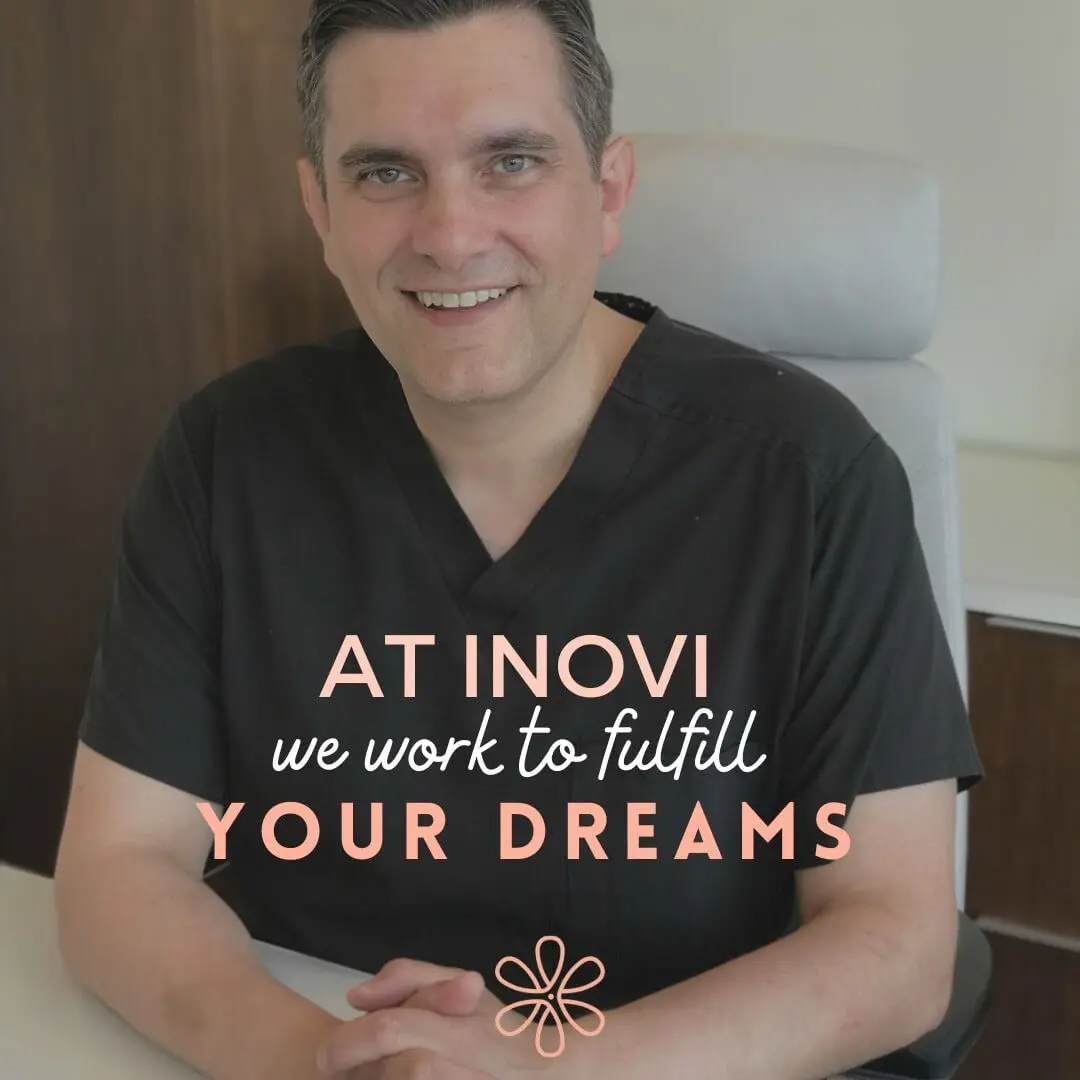
You may be one of the many women or men looking for ways to increase fertility options for future family building.
Those facing cancer treatment, surgery or decreasing fertility often decide to consider egg, sperm or embryo freezing (cryopreservation) to maintain and prolong their ability to produce biological children.
To prepare for a future planned pregnancy, more people are exploring their options. Now with the help of specialized IVF fertility labs and sperm banks you have the opportunity to freeze and store your eggs (oocytes) and sperm in a process known as cryopreservation.
Egg and Sperm Freezing
Freezing your eggs or sperm prior to fertilization can help you achieve your goals. Inovi Fertility and Genetics Institute’s onsite IVF Lab offers you the opportunity to store both eggs and sperm until you are ready. All pre-testing complies with Texas regulations and screens for infection and sexually transmitted diseases as mandated.
Why Consider Egg or Sperm Freezing?
In a woman’s case, your ability to reproduce decreases gradually from the age of 27 to age 35 and more rapidly after 35. This decrease in fertility is also associated with a decline in egg quality, often resulting in rising follicle stimulating hormone (FSH) levels and decreases in Anti-Mullerian hormones.
If you or your partner have been diagnosed with cancer or other conditions potentially impacting reproductive potential you should consider having a conversation with your physician or oncologist about fertility preservation prior to undergoing treatment or surgery. Dr. Stephan Krotz and his fertility team work with your health providers and can coordinate the process to make it easy for you.
Egg and Sperm Freezing For Future Fertility Procedures
When your eggs or sperm are needed for assisted reproductive procedures such as in vitro fertilization (IVF), intrauterine insemination (IUI) or sperm donation, they are available and ready for the thawing process.
How and Why is Egg Freezing Done?
The process of egg freezing known as mature oocyte (egg) cryopreservation, allows a woman to preserve her eggs until later fertilization is desired. Your doctor will meet with you to discuss this option based on your reproductive needs and explain all the risks and benefits of fertility preservation of egg (gamete) and sperm.
If you decide this is the best option for you, your eggs will be collected from your ovaries and frozen (oocyte cryopreservation). When you are ready for them, they are available to be thawed and fertilized. You won’t need a sperm for egg cryopreservation since they are stored while waiting for future fertilization.

Are My Pregnancy Results the Same as with Fresh Oocytes?
Using frozen (vitrified) and warmed eggs (oocytes) has been shown to offer you very similar pregnancy rates as those using fresh oocytes.
With egg freezing you do not need sperm as in the case of embryo freezing (embryo cryopreservation). However in both situations you will be prescribed fertility medications to stimulate ovulation and production of multiple eggs for harvesting.
Additional considerations and conditions for egg freezing (cryopreservation):
- AMH < 1.0 ng/mL
- Desire to delay childbearing
- Endometriosis
- Cancer Treatments or Other Treatments Potentially Harming Future Fertility
Some women or couples choose to freeze their eggs prior to fertilization for religious or ethical reasons.

Short-Term Embryo Freezing-The Freeze All Approach
At Inovi we use the short term “freeze all embryos’ approach for all women under the age of 41 unless they only have one embryo. Freezing allows us to fertilize their eggs quickly after the In Vitro Fertilization (IVF) cycle so that their chances of pregnancy increase.
Statistically, storing extra embryos for a future pregnancy is shown to provide a greater chance of successful implantation vs. egg freezing (oocyte cryopreservation) for later fertilization.
At Inovi we only perform fresh transfer of embryos in cases where women are over 41 or only have one embryo. We freeze all embryos in order to improve the chances for pregnancy success when the endometrium lining in the future allows for best environment for embryo implantation and risks of severe ovarian hyperstimulation is eliminated.
Additionally short-term freezing is proven to be beneficial if you have one or more of these conditions:
- High hormone (estradiol or progesterone) levels which can decrease pregnancy rates
- Unfavorable uterine environment (thin or abnormal uterine lining)
- Desire to perform Preimplantation Genetic Testing (PGT) prior to transferring the embryos back to a patient’s uterus.
Long Term Embryo Freezing
Longer-term fertilization and storage of embryos (embryo banking) is available for those women who may be looking to delay pregnancy for personal or medical reasons.
Sperm Freezing and Future Fertility Preservation for Men
Sperm freezing as well as saving or protecting sperm or testicular tissues allows men the ability to preserve their fertility for future biological children. The process has allowed men to bank their sperm with viability up to 40 years in some cases.
Inovi respects our military and recognizes that with deployment comes risks. We are here to help lessen the burden of absence from your family or partner through reassurance that their sperm will be preserved.
Other Considerations for Sperm Banking
Patients traveling to areas with infectious diseases such as Zika Virus
Transgender individuals prior to embarking on hormone treatment
Additional Information on Future Fertility

How is Sperm Collected?
At Inovi, we use various forms of sperm collection depending on the patient’s condition. The process by which the sperm is collected is dependent on the diagnosis and condition of the male donor. The simplest method is through use of semen following masturbation.
You are provided time and a private room to collect your semen sample for preservation. If you need additional assistance due to medical reasons we may refer you to a urologist who can provide stimulation device to assist in collecting your sperm.
Inovi’s laboratory operate with the latest technology and perform cryopreservation of sperm and testicular tissue in accordance with all state and federal guidelines. We screen all ejaculated or surgically retrieved sperm for infectious diseases per the Food and Drug Administration’s (FDA) mandate and require special written consent for how this material is to be used.
What If I Have a Disability?
If you have experienced a lower extremity disability that interferes with your natural ability to ejaculate, such as a spinal cord injury, we have other devices and equipment to assist you that may require some sedation.
Other Conditions Requiring More Complex Sperm Retrieval in Men
- Klinefelter Syndrome Causing Irreversible Decline in Testicular Function
- Endocrine or Hormone Disorders
- Abdominal or Pelvic Surgery with Potential Ejaculation Complications
- Trauma to the Genitourinary Tract Area
What If I have a Defect in Sperm Production or Ejaculation Issues?
If you have been diagnosed with a condition that causes you to have defective sperm production where no sperm is in your ejaculate, you may be a candidate for testicular surgery to retrieve your sperm for cryopreservation. This will allow you to have the sperm for use with IVF reproduction.
If you think its time to consider future fertility options, our Houston, Texas Inovi Fertility & Genetics Institute is a great place to begin. Inovi specialists are experts in the field of reproductive choices and assisted technologies.
Our fertility team of physicians, nurses and counselors are here to guide you through the process that holds the future of your family.
You may have questions on egg freezing costs or simply your first steps toward fertility treatment. Give us a call today at 713-401-9000 to schedule your new beginning on the path to a planned family!
